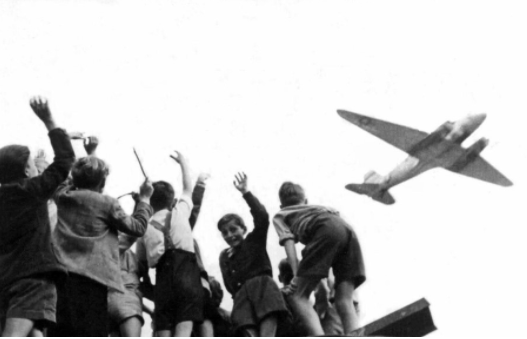We teamed up with the Unknown History podcast on Quick and Dirty Tips to bring you their latest series based on Giles Milton’s Checkmate in Berlin. Episode 10 discusses the Soviet siege of Berlin in 1948. When the Soviets cut off all supply routes to western Berlin, they didn’t anticipate the ingenuity and tactical planning skills of Army Brigadier General Frank Howley. Could the Berlin Airlift really keep the entire city alive during the siege?

A besieged city requires a number of essentials if the inhabitants are to be kept alive. Clean drinking water is vital, as is sufficient food, fuel, and medication. An acute shortage of food cost thousands of lives during the Siege of Leningrad (1941–44), while a lack of fuel caused extreme deprivation during the 1870 Siege of Paris. A further requirement is the maintenance of morale: If the besieged inhabitants lose faith in their leaders, the will to resist is rapidly undermined.
Western Berlin’s stockpile of supplies was meager indeed in the spring of 1948. The small British garrison had enough food for 37 days, but the population of the city’s Western sectors, some 2.4 million people, could be fed for just 27 days. There would be enough petrol for 10 weeks if it were severely rationed, and coal for perhaps half this time.
American warehouses also contained two hundred tons of condensed milk and a stockpile of powdered milk, emergency supplies that Howley had prudently imported to the city. Yet it was nowhere near enough. Grand historical parallels were uppermost in Howley’s mind in those opening days of the siege. “The cold inhuman minds of the Kremlin had reached a wicked decision, the most barbarous in history since Genghis Khan reduced conquered cities to pyramids of skulls.” Howley knew that the closing of the land routes had marked the end of the Phoney War and the beginning of a battle for survival.
The situation seemed hopeless to most of the city’s inhabitants as well as to the Western-allied garrisons. Howley alone harbored a ray of optimism for the showdown to follow. “Although the Reds had succeeded in cutting us off completely by land, depriving us of the autobahn, the railroad, and the canals,” he said, “the blockade had one flaw. Moscow didn’t control the skies.”
The three air corridors to the capital had been agreed upon in writing back in 1945. The Soviets had no means of stopping the allies from using these corridors, short of shooting down their planes. This was something that Howley gambled they would not dare to do. Yet supplying 2.4 million inhabitants by air was logistically impossible, as his Basic Assumption Plan had revealed. Absolutely everything needed importing: salt, milk, coal, potatoes, fat, sugar, medical supplies, and gasoline. It could not be done.
Russia’s insistence in 1945 that the Western allies feed their own districts of Berlin had given Howley a very precise idea of the city’s daily requirements: 641 tons of flour, 150 of cereal, 106 of meat and fish, 900 of potatoes, 51 of sugar, 10 of coffee, 20 of milk, 32 of fats, and three tons of yeast. He also knew exactly what he had in the city’s warehouses: 17 days’ supply of flour, 32 days’ of cereal, 26 days’ of milk. But Berlin required more than food: all fuel supplies had also been stopped by the Soviets.
Without coal, there could be no electricity. Without electricity, there could be no functioning sewage plants. No heating. No lighting. No clean water. Berlin’s drinking water had to be pumped upward from deep underground aquifers through a natural filter of sand and gravel. If the pumps failed, the water supply would falter. Disease would run rampant, and people would die.
To learn more about the history of World War II, visit Unknown History on Quick and Dirty Tips. Or, you can listen to the podcast below.
